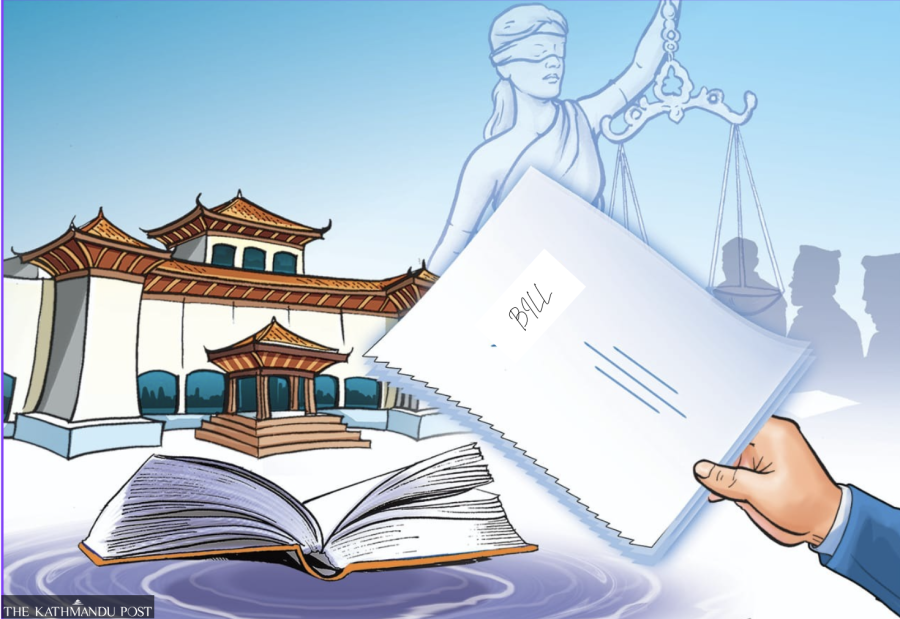Columns
Weak laws protect corruption
The bill to amend the Prevention of Corruption Act, 2002, shows the deteriorating political mentality in Nepal.
Paban Raj Pandey
Lawmakers’ brazen but futile attempt to impose a five-year statute of limitations on corruption cases lays bare not only the extent of corruption in Nepal but also how far they will go to absolve the corrupt from wrongdoing. Members of the State Affairs and Good Governance Committee of parliament are working to finalise the bill to amend the Prevention of Corruption Act, 2002, which is the prime corruption law of the land. After widespread public objection for weeks over the amendment, Home Minister Ramesh Lekhak informed the committee in late August that the KP Oli-led government would no longer proceed with the proposed amendment. But the withdrawal raises more questions than answers.
The issue in question involves Section 45 of the Act, which states that public servants can be prosecuted for corruption they committed on the job even after they leave office. Plain and simple! It sets no time limit within which legal proceedings may be initiated. However, the proposed bill does, dividing Section 45 into three different Sub-sections, of which Sub-section 1 requires that a corruption case must be prosecuted within five years of knowledge of such an act. Sub-section 3 says that the five-year limit does not apply to corruption arising out of misuse of government, community and public property. The five-year statute of limitations would have simply enabled corruption to take deeper roots.
The bill was first registered in the National Assembly in January 2020. KP Oli was the Prime Minister back then. The Oli-led Communist Party of Nepal (United Marxist-Leninist) and Pushpa Kamal Dahal-led Communist Party of Nepal (Maoist Centre) allied to contest the 2017 general elections and dominated, winning 121 and 53 seats respectively in the 275-member House of Representatives. The two parties even merged in May 2018, but a Supreme Court ruling rendered the merger defunct in March 2021. The bill was registered in the National Assembly as they had a two-thirds majority, with the UML’s Ganesh Prasad Timilsina as the chairperson. The Upper House passed the bill in March 2023.
No statute of limitations on corruption
The bill is now at the House of Representatives. Again, Oli, the leader of the second-largest party with 79 seats, heads the government. After the UML withdrew support to his predecessor Dahal, whose party is the third-largest with 32 seats, Oli has been in power since mid-July this year. And, as luck would have it, with the backing from four other coalition partners, including the largest party with 88 seats, the Nepali Congress, Oli enjoys a two-thirds majority. Dev Raj Ghimire of the UML leads the House, while Ramchandra Poudel, a Nepali Congress veteran, is the President. Oli probably thought he would be able to ram the bill through. But opposition—among politicians, the media and the public—thankfully, was huge.
Consequently, the government was forced to change the course of its half-baked plan to codify a five-year statute of limitations. But the fact that they had the audacity to even propose such an idiotic idea at all is a testament to the deteriorating political mentality in Nepal. Pervasive corruption in the top echelons of the government is no longer news. Be it a case of illegal grabbing of public lands or sending Nepalis as Bhutanese refugees for monetary benefit, the political elites are immersed in corrupt practices up to the gills. Last year, Transparency International’s Corruption Practices Index ranked Nepal 108th out of 180 countries and territories, giving it a slim score of 35 out of 100.
A weakened justice system reduces accountability for public officials. If the proposed amendment had become law, this would have only increased impunity for corruption. Now that the Oli administration has clarified that it is no longer pursuing it, lawmakers should focus on a different act. Sub-section 2 of Section 13 of the Commission for the Investigation of Abuse of Authority Act, 1991 already limits the time for the CIAA to initiate prosecution to five years of corruption taking place. In essence, if someone commits corruption and manages—using some of the ill-gotten wealth—to suppress the crime for five years, he gets off scot-free. As unreal as this may sound, this is already the law.
Blow the whistle
Ideally, the Prevention of Corruption Act, 2002, and the Commission for the Investigation of Abuse of Authority Act, 1991, should not conflict with each other, but that is precisely what they do regarding the statute of limitations on corruption. Ironically, the CIAA was formed as far back as February 1992—a couple of years after the civil unrest that led to the onset of a multiparty system in April 1990—with a noble goal of corruption control within the government. It is an autonomous constitutional body. Yet, it routinely takes the flak for only going after and successfully prosecuting the small fish, not the big ones. The aforementioned Sub-section 2 of Section 13 of the Act is a loophole and must be plugged.
Prem Kumar Rai, former home secretary, is the current chief commissioner of the CIAA. The post is a political appointment, as is, let us say, ambassadorial. This is how it is practised in other countries as well. But the main difference here is that these positions—among others—are filled more on party quota and less on merit. The appointees thus feel obligated to be loyal to the party and/or the leader who appointed them. Oli appointed Rai in February 2021. Then, there is the unfortunate practice of ministers, and even the prime minister, making Cabinet-level decisions that are treated as above the law. This does nothing but help foster policy-level corruption, such as the one regarding Lalita Niwas.
Oli, Dahal and Sher Bahadur Deuba, a five-time prime minister and Nepali Congress president, sing their own praises as to how they have actively fought corruption. Yet the public wonders how most politicians who entered Kathmandu wearing slippers are now worth millions. If these leaders are seriously committed to combating corruption, they can show it by strengthening the laws surrounding whistleblowers, who would step forward through a robust legal framework of protections and rewards. The public would earnestly appreciate it. Their level of frustration is so elevated that any political party that dares to take on corruption head-on is likely to get rewarded handsomely in the 2027 general elections.




 8.26°C Kathmandu
8.26°C Kathmandu















